Summary of movement
Survivalism is the practice of preparing for the imminent apocalyptic destruction of society. Survivalists are also known as ‘preppers’ because of this focus on preparation for catastrophe.
Survivalists prepare for a future where governmental and civic infrastructure fails. In most imaginings, this failure might be caused by ecological disasters, economic collapse, civil war (especially along racial lines), nuclear attack, and foreign invasion. The focus in survivalism is most often on practical steps required for surviving disaster without a functioning human society.
The survivalist focus is on how to survive these events through stockpiling resources, planning escape routes, and buying remote properties in which to ‘bug out’. Some survivalists have already moved to remote locations and live ‘off grid’. Others continue with mainstream lifestyles, but invest in different levels of preparation for a future ‘apocalypse’.
The full text of this article has been moved to CenSAMM's open access Critical Dictionary of Apocalyptic and Millenarian Movements.
It is available at: https://www.cdamm.org/articles/survivalists-and-preppers

- History / Origins
-
Survivalism is a modern American phenomenon that has recently spread beyond the US to Europe, and other parts of the world. Sociologist Philip Lamy (1996: 69) traces the origin to the aftermath of the destruction of World War II and the advent of the nuclear age. The Cold War and the military conflicts in Korea and Vietnam spurred interest in disaster preparedness, from the simple ‘duck and cover’ strategy to the more complex recourse of building nuclear bunkers.
Duck and Cover 1951 Bert the Turtle.
As the complexity of society increased, particularly in supplying everyday needs, survivalism and disaster preparedness grew as counter-strategy. People wanted to know what to do if all the benefits and conveniences of society went away. The term ‘survivalism’ was coined in 1975/6 by Kurt Saxon, with the contemporary meaning of practising survival skills in anticipation of the apocalypse or in fear of the government (Saxon, 1980).
From the 1980s, survivalism has developed into a multibillion dollar industry. Specialist publications such as Solider of Fortune magazine and later website were released. Expositions of survivalist equipment began to be held for those interested in amassing resources.
In 1983-1984 the Covenant, Sword, and Arm of the Lord group established a “survivalist commune” and tried to start a race war using guerrilla tactics until they were disarmed and disbanded after an FBI raid (Barkun 2011: 655). From the 1990s, survivalism became even more associated in the popular imagination with the militia movement and far-right radical politics.
This association was born from incidents such as the 11-day siege and shootout between federal agents and the Weaver family at Ruby Ridge, Idaho; and the siege and destruction of the Branch Davidian Compound in Waco, Texas. The deaths at Waco and Ruby Ridge were seen as martyrs for survivalism by some on the far-right. They felt the government was attacking those who chose to fend for themselves and they had to counter-attack (Lamy 1996: 19-21).
This spurred the organisation of militias, such as the Montana Freemen, particularly in rural areas of the Western US (Wessinger 2000: 158-203). Timothy McVeigh perpetrated the Oklahoma City Bombing on the anniversary of the end of the siege at Waco, claiming he was fighting back against the government for this event through destroying a federal building and killing 168 people (Wright 2007).
There are still many groups of racist right-wing millenarians who practice survivalism, especially those holding beliefs related to Christian Identity, Neopaganism, and Odinism (Barkun 1994, 2003, 2011). The most recent far-right survivalist groups to emerge since the 2008 American election are the Three Percenters, the name referring to the number of gun owners who would refuse to disarm if required by the government, and the Oath Keepers, a group of former and current law enforcement officers. Both are anti-government and pro-gun ownership (Tabachnick, 2015 and Sunshine, 2016).
However, survivalists can also hold left-wing politics. Many of these come from a New Age rather than Christian background, especially those primarily concerned about potentially apocalyptic effects of climate change. Survivalism in this context has its origins in the 1960s-1970s’ communitarian movements of back-to-the-landers and voluntary simplicity. Survivalists inspired by these historical roots tend to place greater emphasis on ecology and sustainability, and less on stockpiling resources.
Helen and Scott Nearing were the founders of the ‘modern homesteading movement’. They were vegetarians and socialists with a background in Theosophy; they set up an off-the-grid homestead in New England and aimed to provide for all their needs self-sufficiently (Gould 1999, 2005).
A notable New Age group practising survivalism is the Church Universal and Triumphant, whose beliefs combine Theosophy, Christianity, and Eastern religions. In 1990, their leader, Elisabeth Clare Prophet, prophesied nuclear war, and so the group stockpiled weapons and resources in their Montana ranch as preparation (Lewis and Melton 1994; Stars and Wright 2005; Prophet 2009). The predicted attack failed to come about, and the group was subsequently raided by federal agents.
Like more religiously-oriented millenarians, survivalists read current events as signs of impending catastrophe. At the turn of the century, the Y2K bug provided fresh impetus for survivalism, highlighting the reliance of modern society on computers, as it was feared that a coding glitch would cause all computers to cease functioning. The 9/11 attacks renewed the threat of external enemies that had diminished since the end of the Cold War, whilst the responses of official agencies to Hurricane Katrina and the Indian Ocean tsunami led some to perceive governments as poorly prepared for large-scale disasters. Recent current events have exacerbated fears of terrorism, climate change, and nuclear war, all of which feature as imminent existential threats to society in the minds of survivalists. Since the 2016 American election, groups of ‘Liberal Preppers’ have emerged who fear the current administration will bring on an end of the world scenario (Sedacca , 2017).
Survivalism is gaining popularity in the UK, where the term ‘prepper’ is often preferred in order to distinguish it from the more weapons-oriented US phenomenon. The emphasis is also different because of the differences in government and history between the two countries.
In the US, the first settlers are seen as ‘survivalists’ although they themselves did not use the term. They are the inspiration for modern survivalists (Lamy 1996: 65-66). Being American is associated with self-sufficiency and self-reliance; the early pioneers epitomise this in popular culture. This is an imaginative reconstruction rather than an evidence-based assessment of what life for the early American settlers was like. It provides the mythological history of contemporary survivalists, what sociologist Richard G. Mitchell calls “the romantic notion of autonomous frontier life” (2002: 149). Early American settlers are assumed to have lived without recourse to complicated networks of supplies for their subsistence. Settlers on the American frontiers were largely responsible for growing their own food and protecting their own land.
Contemporary survivalists are anxious about modern dependence on social networks of supply for subsistence. If networks are disrupted, there will be big problems in ensuring safety and food for large populations. Survivalism becomes a way to buttress against this potential calamity. Survivalists try to be prepared for the impacts of changes to networks beyond their control. It is a reaction to the interdependence and complexity of modern society.
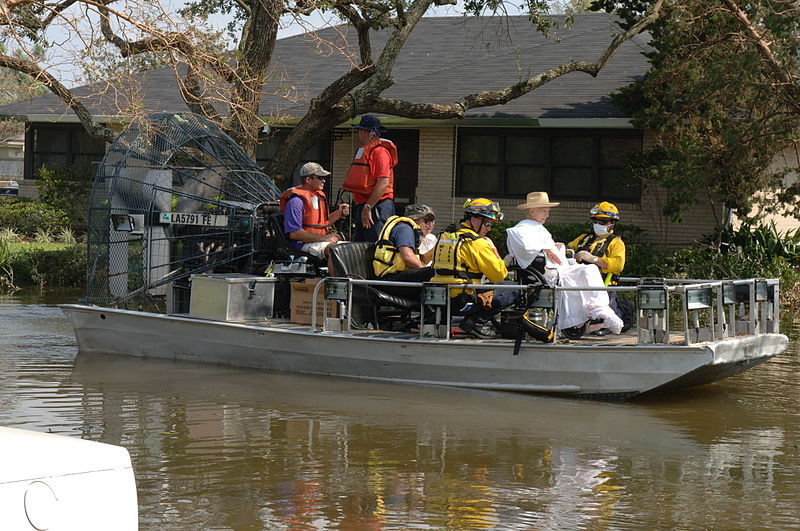
New Orleans, LA, August 31, 2005. A resident is transported by a FEMA Urban Search and Rescue Team from Missouri away from her house which she was unable to vacate due to Hurricane Katrina. The City of New Orleans was being evacuated following Hurricane Katrina and rising flood waters. The response to Hurricane Katrina increased fears that the government would not help in case of natural disasters.
- Beliefs
-
The central unifying belief of survivalism is that social collapse is possible and imminent. Society will break down and then it is up to individuals or small groups of individuals to fend for themselves. Since the breakdown of the current social order is on the horizon, it is necessary to prepare for life without it through various practical steps.
Survivalism has developed to a large extent through online communities; as such there are numerous acronyms and abbreviations used to sum up the main premises. TEOTWAWKI means The End Of The World As We Know It; the frequently used term by survivalists as a catch-all for imminent social collapse. WTSHTF is When The Shit Hits The Fan, and refers to the same idea. WROL, Without Rule of Law, refers more specifically to post-apocalyptical scenarios when the legal system and law enforcement functions of society have ceased.
Survivalist beliefs revolve around end of the world scenarios that are survivable, and so they refer to the end of the world as we know it, which is not the same as total destruction of the world or the end of the world in Christian eschatology. Their beliefs suggest fear of dependence on the modern nation state and urbanism, the associated amenities and supply chains, without which there would be chaos. They focus on a way to cope with this chaos.
Much of the discussion among survivalists focuses on what to do when the post-apocalyptic chaos occurs. The main strategies are termed as either ‘bug out’ or ‘bug in’. Bugging out is escaping, often retreating to a rural or sparsely populated area where a safe place has been established. Bugging out requires a means of escape, referred to in online communities with the acronyms BOB, BOV, BOL standing for bug out bag, bug out vehicle, and bug out location. Bugging in is staying in one’s own home, which requires amassing stockpiles of resources and potentially setting up fortifications.
Survivalism is focused on individual salvation, there is not a messiah coming to save anyone. This emphasises self-reliance; survival lies in one’s own hands. There is a focus on anthropogenic apocalypses, especially economic collapse, ecological disaster, and race war. Each of these eventualities is believed to cause the partial or total breakdown of the social order resulting in chaos. The idea of an ‘Ecoapocalypse’ has become a particular focus due to projections of catastrophic climate change undermining the current economic configuration of society (Lamy 1996: 84).
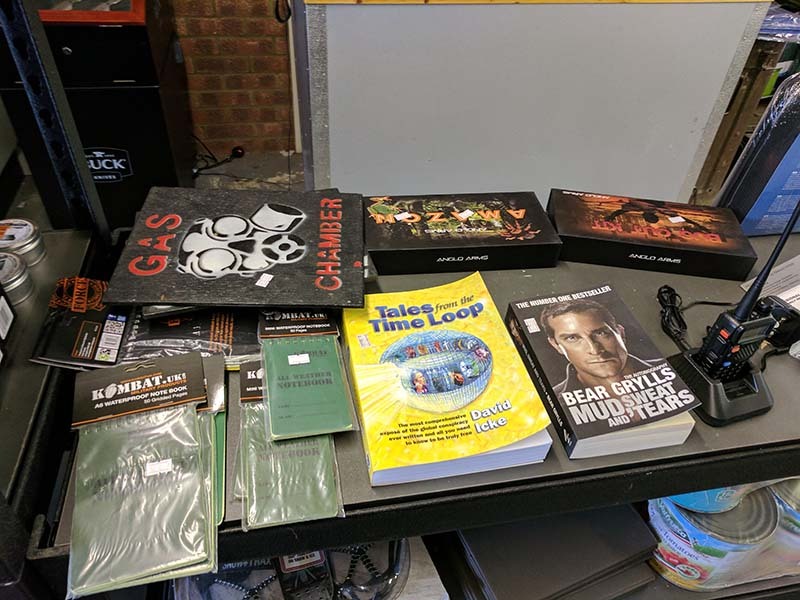
Books for sale at the UK Prepper Store, Bedfordshire
Survivalism rests on a philosophical basis of autarky, political and economic self-sufficiency, where an entity survives without recourse to outside assistance or trade. In the US, the focus is on land use disputes, distrust of federal government, self-reliance, importance of local governance over federal, and a general anti-statism.
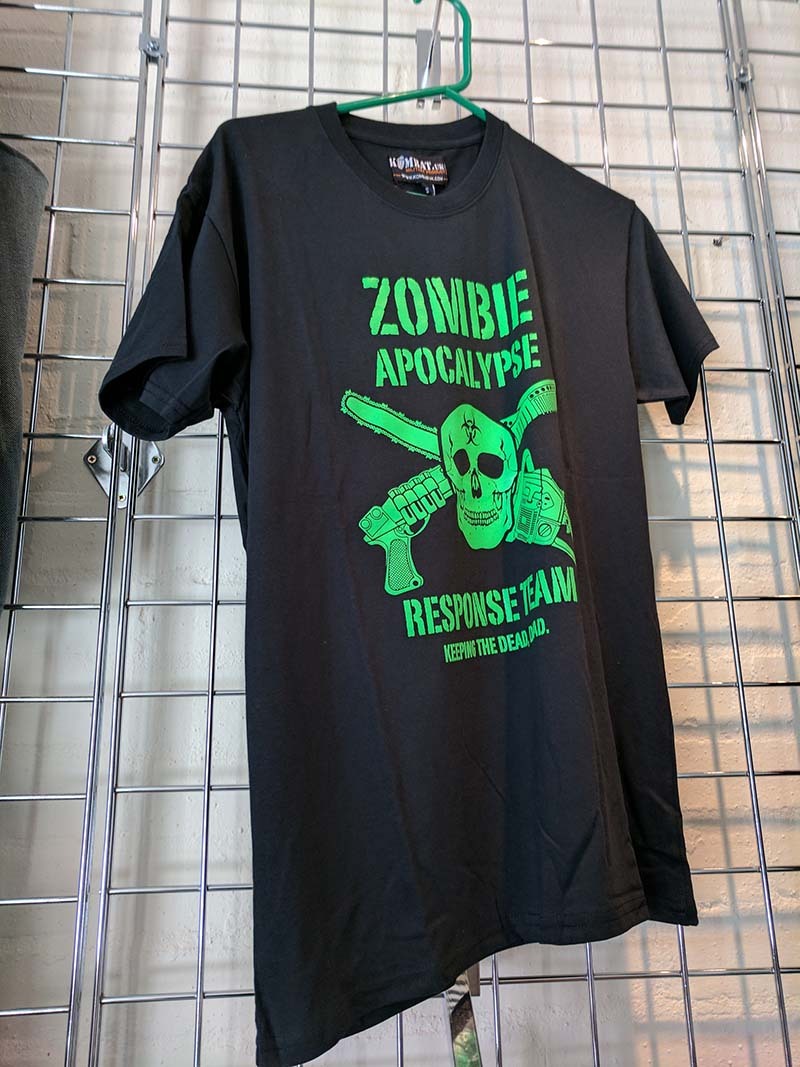
T-Shirt for sale at the UK Prepper Store, Bedfordshire
- Millennial Beliefs
-
Survivalism is inherently millenarian because it proposes the imminent collapse of society, the end of the world as we know it, and emphasises the importance of preparing to survive this. This is why Lamy defines survivalists as Tribulationists because they are preparing to survive the end times or believe themselves to be already living through times of suffering prior to the final destruction of this world (1996: 6).
How to Bug Out
Lamy calls survivalists secular millenarians because the focus is on a man-made apocalypse and survival of it is also in their own hands (1997: 94-95). Unlike in Christian eschatology, there is no elect who will be saved by divine intervention in the Rapture. It is every person for him or herself in a brutal form of social Darwinism. The survival of the fittest in this context meaning those with the foresight and best preparations will survive.
By contrast, those who do not prepare are called ‘zombies’ – everyone who thinks some wider social system will come to save them during a crisis. These are the ‘non-believers’ in this context. This separation of the prepared from the non-prepared, zombies from awakened preppers, can slip easily into chauvinistic Aryan philosophy: that those who prepare are superior to those who do not. This is perhaps one of the reasons survivalism appeals to so many on the far-right.
However, historian Eckard Toy suggests that survivalists and right-wing political extremists are separate subcultures that share some common ground, such as paramilitary training, interest in secrecy, and apocalyptic beliefs in the inevitable destruction of modern society (1986: 80). There are many different ideologies within the rubric of survivalism. It is an open question as to how religious survivalists are; since survivalism is decentralised and non-institutionalised, it is not linked to any specific religion in a formal way. However, it is more common amongst Christian sects, especially those that espouse a far-right political philosophy.
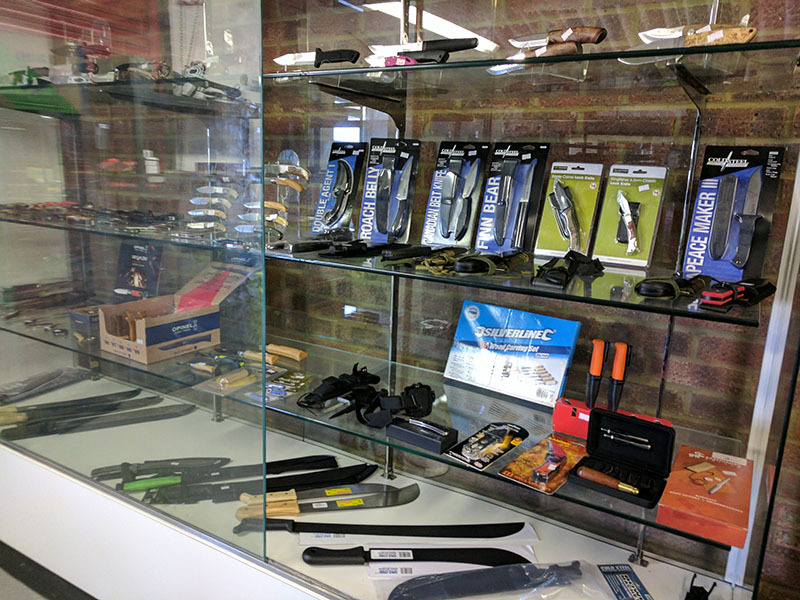
Knives on sale at the UK Preppers Store, Bedfordshire
- Practices
-
Survivalism is above all a practice, arguably more than it is a movement or even a system of beliefs. Survivalism is something groups and individuals do; a way to prepare for the end of the world, summed up as a verb: ‘to prep’ and ‘prepping’. If a movement as such does exist, it flourishes most strongly in online communities; many are merely interested, reading articles and blogs, and/or commenting on forums, whereas others take practical steps to prepare, sometimes making substantial financial investments.
For those who do begin investing in survivalism, the first step is buying, storing, amassing, and even concealing supplies such as fuel, medicine, food, tools, and weapons. This may be simply packing a ‘bug out bag’ with essentials like a first aid kit, compass, Swiss army knife, and some MREs (meals ready to eat). Storage of essentials can expand to fill available space – a spare room, the garage, a shed in the garden.
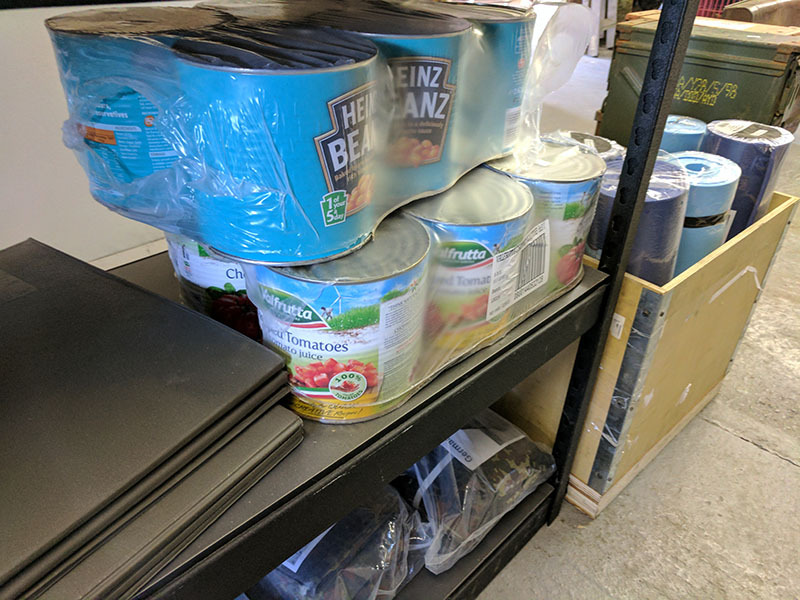
Bulk canned goods for storage
Some survivalists are concerned with protecting their cache from ‘zombies’, the unprepared masses who will be a threat after a catastrophe, and so they go to elaborate lengths in creating hiding places for their stashes. The concern is that food stores, hospitals, and petrol stations will only have reserves for around three days, so even a small disaster could result in lack of access to necessities. Survivalists often try to maintain a certain amount of resources through calculating how much they will need, 24 hours, 72 hours, three weeks, or more, depending on the space they have to stock in. Survivalist stores, such as the Prepper Store in Roxton, Bedfordshire, sell ‘bundles’ advertised as containing essentials for a specified amount of time.
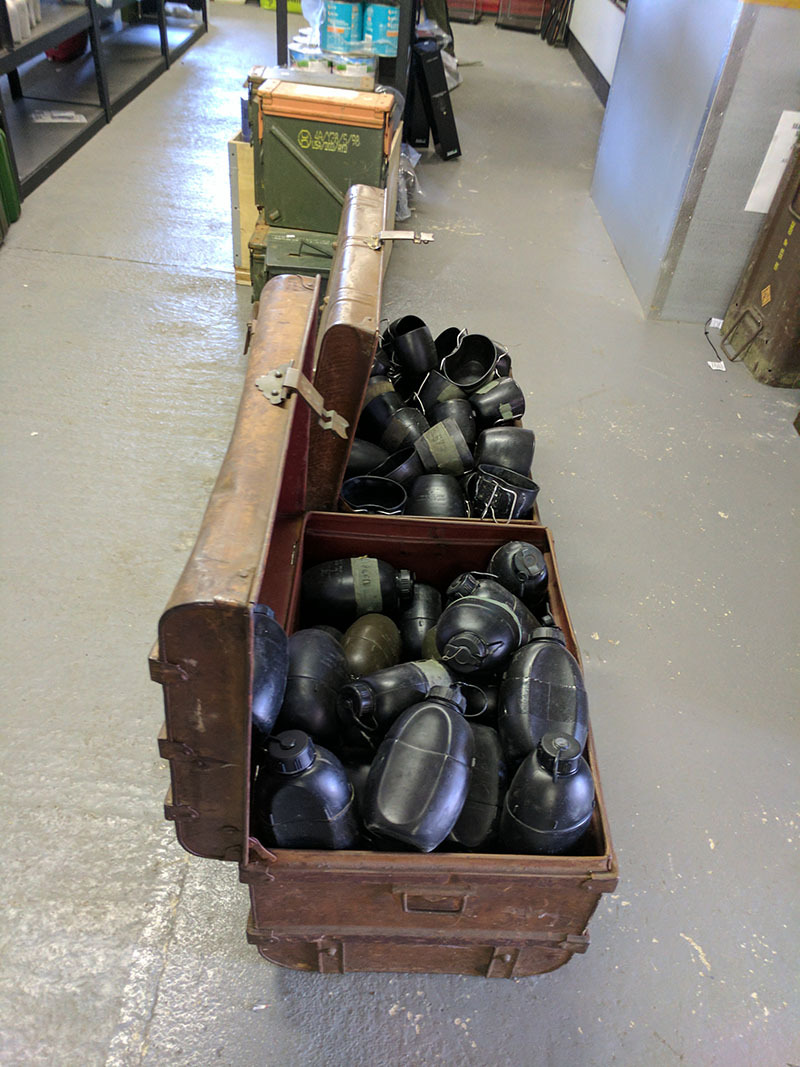
Canteens for storing drinking water
Stockpiling resources is predicated on having space to store them. Increasing storage can segue into building emergency shelters or bunkers that also provide a safe place to escape to, a transition from ‘bugging in’ to ‘bugging out’. Some survivalists buy retreats in isolated rural locations; this is the somewhat stereotypical image of the prepper hiding out in a cabin in the woods. However, properties can be bought as tax write-offs, rental or vacation use, retirement home, and then double as retreats. Some buy whole tracts of land for communal shelters or selling bunkers, such as the Survival Condo Project in Wichita, Kansas, a 15-storey apartment complex built in a converted underground missile silo where units were sold for between $1.5-3 million (Osnos, 2017).
Religious groups that practise survivalism, such as the Church Universal and Triumphant and the Branch Davidians, built whole retreats in isolated locations to live as a group and communally share resources, providing a feeling of safety in numbers and a survivalist community of likeminded believers.
In the US, survivalism dovetails with rural living off-grid, practising self-sufficiency without recourse to government services or utilities in areas where they are already limited. The sociologist Richard G. Mitchell suggests this is the reason for the popularity of survivalist retreats in Southern Oregon (2002: 33). In the UK, this is much more difficult as there are few undeveloped areas that would provide much cover for concealment and there are no large expanses of off-grid areas as there are in the US. Lincoln Miles gave this as the primary reason why ‘bugging in’ was more practicable for UK preppers than ‘bugging out’. “Where would you go?” he asked rhetorically, “You could go to the woods but you’d probably find a family having a picnic there.” In the UK, there are few areas in which to escape urban on-grid society.
Survival Condo Project, Wichita, Kansas
Alongside shelter and resources, financial preparedness is another important aspect. Dislike of dependence on social institutions and distrust of banks in particular leads many survivalists to avoid indebtedness. As well as storing foodstuffs, some have three months’ worth of outgoings in savings, or one month’s expenditure in cash on hand. For some having gold or silver is important in case of sudden and massive devaluation of paper money in an economic collapse. However, this is worthless in the case of a total social collapse. Mitchell reports that some survivalists try to establish alternative monies and economies, particularly barter and trade, in order to obtain essentials they cannot make themselves or have stored (2002: 38). Of course, the ability to prepare is mediated by economic resources. The very rich can buy land in New Zealand or the Pacific Northwest, have a private plane or boat ready as a ‘bug out vehicle’, and store months’ worth of supplies in a special purpose location as reported recently in a New Yorker article about Silicon Valley entrepreneurs who were also survivalists (Osnos, 2017). The poor are more limited in their means to prepare. Furthermore, prepping is itself an economic activity; it requires a job in society to pay for buying and storing rations. Sometimes prepping can become a means of subsistence, for example Lincoln Miles found he could support himself and his family through his store selling survivalist supplies.
As well as amassing resources, developing skills is important. This can involve learning basic first aid, wilderness survival skills such as fire-starting, navigating without maps, hunting, building shelters, taking courses in bush craft and other skills for surviving without society. Courses offering these skills are places preppers congregate, as well as prepper ‘fests’, military equipment auctions and expos, ‘war games’, or training exercises (Mitchell 2002: 57).
There is a focus on firearms and paramilitary training in media accounts of survivalism. However, it has been argued that the vast majority of survivalists tend to be law-abiding and conformist (Mitchell 2002: 149). Much of the talk about weapons and survival skills is dependent on society ending; it is what they would do after society is gone, not before. Mitchell emphasises the creativity and crafting of survivalists; they are not reactionary. They are trying to create new economic and social spaces. In rejecting passive consumerism, they have an active, entrepreneurial form of association and sociality. Due to the strong connection with paramilitary groups and extremist violence in the media and popular imagination, some will go to lengths to try to emphasise that this is what they are not.
UK Survivalists: The Prepper Store, Bedfordshire
Much survivalist culture in the UK happens in online forums, such as UKpreppers or Ludlow preppers. In general, although influenced by the US, survivalism in the UK seems more focused on acquiring skills and resources and less on any specific political or religious beliefs – and far less emphasis on weapons. There are much tighter restrictions on owning and buying weapons in the UK. The term ‘prepper’ seems to be preferred to ‘survivalist’.
Lincoln Miles (b. 1994) owns and operates the Prepper Store from a commercial site on farmland near Roxton, Bedfordshire. I interviewed Miles in April 2017.
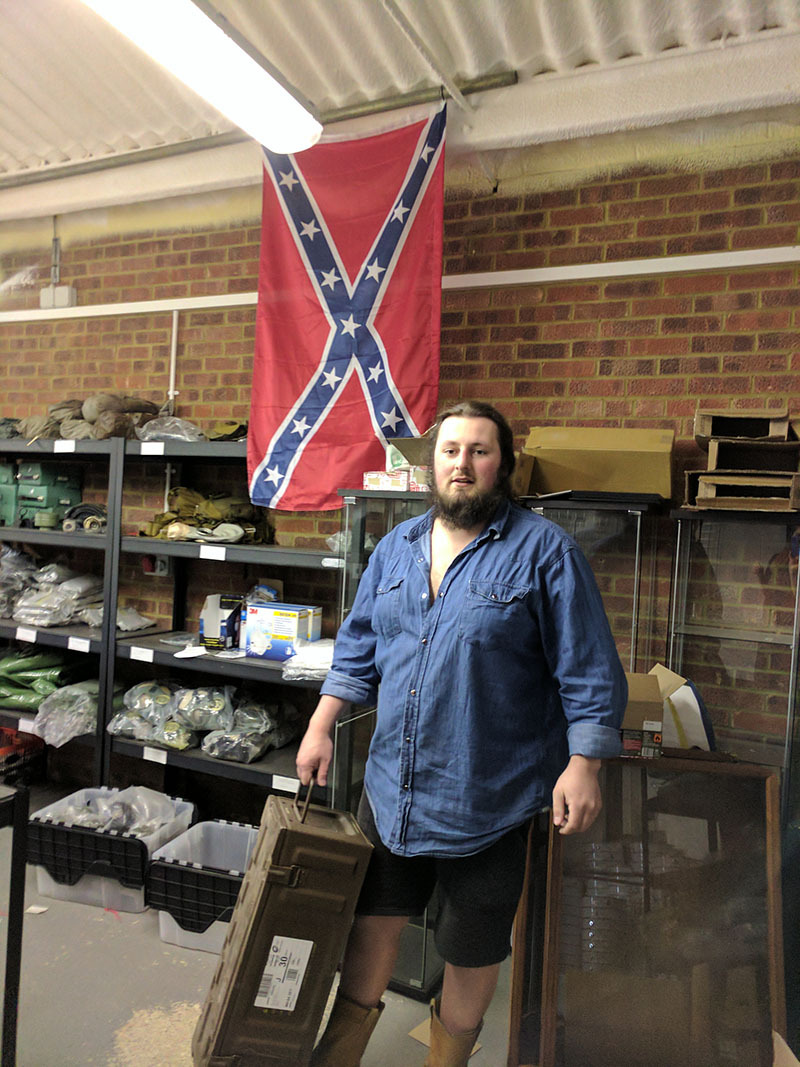
UK Prepper Store owner Lincoln Miles standing in front of the Confederate flag that hangs inside the store
He started the store in 2014, at first selling items online and then, after 3-4 months, opening a physical store. Originally he sold surfing goods, but found the survivalist gear sold far more quickly, and now focuses only on that. He claims his store is the only prepper store in the UK; there are military surplus stores and camping goods stores that sell some of the same items. However, he argues that his is the only store that brings together the specific range that preppers want. The store sells gas masks, camo, canteens, knives, swords, crossbows, water jugs, ammo cases, slingshots, tools, clothing, hazmat suits, tents, and a few books. There is a larger stock available on the website which is ordered only when a customer places an order. The best-selling item is the gas mask, sales of which increased after the recent escalation of nuclear tensions between North Korea and the USA.
Miles observed spikes in business when current events are perceived as threatening, such as recent fears of nuclear war, flooding, and when government agencies release recommendations for stocking up essentials in case of disaster. People respond to fears by prepping, buying what they can. “It gives people a feeling of control”, Lincoln speculated. Ebola increased his business substantially in 2014, when reports of the epidemic in West Africa came out; he was selling hazmat suits and gas masks as quickly as he got them in. Ebola was good for business because people were afraid it would spread in the UK. There was little that people felt they could do so they bought what they could to prepare.
Miles agreed that preppers in the UK are inspired by US survivalists. However, he characterised UK prepping as “calmer” and “more practical” with fewer “nutters.” This may be to do with more limited access to guns and other weaponry as well as strict regulations on hunting and limited areas of uninhabited land.
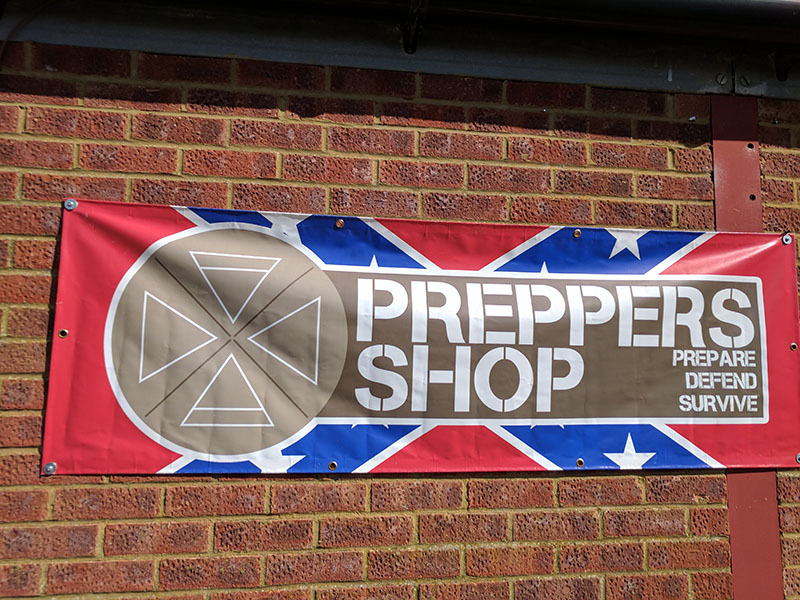
Sign outside the UK Preppers Store, Bedfordshire depicting a Confederate Flag in the background and a circular symbol with four triangles.
However, the sign on the outside of Miles’ Preppers store depicted the Confederate flag. Inside the store hung a Confederate flag and they were also on sale. When I asked about it, Miles said it was not about the politics of the flag, but an aesthetic appeal. He liked it; it was decorative. He claimed it was a regular feature of the American car shows, featuring pickup trucks and ‘muscle’ cars, held in the UK that he attends. For Miles, the symbol was not racist, but part of the culture of car shows and prepping that he likes.
Prepping is a way of taking control over the future for Miles, a way of being prepared for whatever happens, including the end of the world or downfall of society. He also emphasised that prepping is a way of having hope; hope that regardless of what happens he will be able to survive. Self-reliance was important to him personally. He did not even really like relying on others for lifts. He speculated it was a major motivator for his customers too.
He seemed more concerned with the incompetence of the government than its malevolence. The distrust of the government he expressed was that they do not have the resources or the will to help people in the event of a disaster. The government does not fund public services enough to be able to deal with disaster. Even if they wanted to help they would not have the ability. Miles focused on economic collapse as a likely end of the world scenario: if the economy crashed more severely than in 2008, it would lead to civil unrest. Since the economy was so interconnected, if one sector failed there could be chaos. He gave the example that the energy supply in the UK is dependent on Russia; Russia could “pull the plug” on the gas supply and there would not be any power in the UK. Dependence on other countries for resources was worrying to him. Prepping is a way of ensuring his and his family’s needs are met in case of disaster.
Miles has a wife and a five-month-old daughter. His wife “leaves me to it”, meaning that he takes care of the prepping for survival aspect; she is glad he does it but not personally active in it. His father and brother are also preppers. He first got into prepping through reading an article in the Fortean Times. It was “conspiracy theory stuff”, which he used to think was all rubbish, but this article made sense to him.
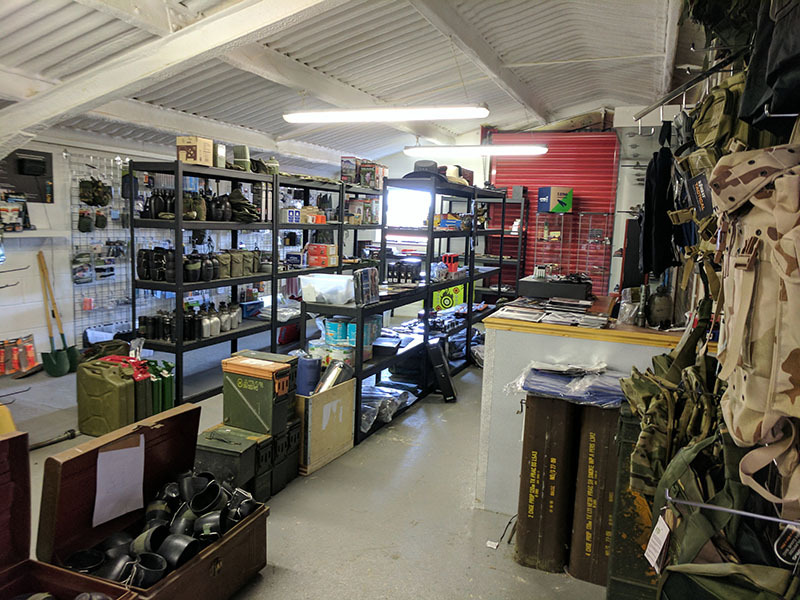
The interior of the UK Preppers Store, Bedfordshire
Over time, Miles got more into prepping; at first he bought stuff he wanted, then sold the rest on via the internet, and then set up the shop with only around £1000 capital and no loan from the bank because the rent in the rural location was so cheap. When the store started and prepping became a bigger thing in the UK a few years ago, there were media reports trying to portray them as US-style survivalists. Now media reports are more focused on people buying essentials to help survive disasters. Stockpiling food is a rational response to uncertainty – not an irrational fear according to Miles.
Miles has around 3-4 weeks’ food stockpiled in a shed. He’s a ‘bug in’ rather than ‘bug out’ prepper. Since there is nowhere to go in the UK, the few isolated areas that there are would be overrun in case of a catastrophe, so all he can prepare for is to stay in his own home and survive. Miles thought there was much less religious belief about a coming millennium compared to US survivalists. UK preppers are focused more on social threats. Climate change is a big fear for people. In the UK there has been more flooding in recent years, so people living in flood plains are often customers, buying supplies in case they are cut off. Also rural people who face potential isolation any time will prep because that is part of their way of life.
Miles related survivalism to a form of insurance. Just as you have insurance in case your car breaks down, survivalism is a way of having insurance in case society breaks down. That way you can continue to supply your needs even if the social institutions that you normally rely on are absent.
- Controversies
-
Survivalists are closely associated with violence in the public imagination because of the historical connection with militia movements and far-right groups. More broadly because people amassing large amounts of weapons are treated with suspicion.
While most survivalists focus on waiting and preparing for the end, some decide to act upon their expectations as ‘forcers of the end’ and bring about the apocalypse by, for example, not only stockpiling weapons but also taking up arms against the government, or trying to start a race war (Barkun 2003: 60).
Sociologist Richard G. Mitchell suggests that the media over-reports the actions of a violent few, who are taken as representative of ‘all’ survivalists, and the crucial ‘what if’ proposition is left out (2002: 16). Survivalists are collecting weapons and other resources so that they are prepared for what happens if society falls; very few move towards trying to actively make society fall through violence. The over-representation of violence mirrors the media and public attitude towards millenarian groups more generally, where the violent few stand metonymically for the whole.

The stockpiling of weapons often brings attention of authorities that would not have otherwise been aimed at survivalists. Guns are a prominent feature of US survivalism but they are almost entirely absent in the UK subculture.
In the US, stockpiling guns in order to defend oneself from the federal government can be a self-fulfilling prophecy. The act of acquiring the guns causes federal agencies to pay attention to individuals and groups and even raid them for this reason. This was the scenario with both the Branch Davidians and Church Universal and Triumphant. If they had never had guns would these groups still have encountered problems with government agencies? In the UK, guns and even knives are very hard to amass given the strict regulations on owning weapons of any kind. The biggest difference between US and UK survivalists is perhaps the role of guns, which dominate in the US but are almost entirely absent in the UK.
- Personal Reflections
-
Nic, Oregon survivalist: “[The reporter] wanted to know what survivalism was, and I told him it is just having the knowledge, skills, and equipment to be ready for anything. Then he wanted to know what we were going to do with ‘all our guns’, and I told him, ‘nothing’. We [survivalists] go by the same laws as anyone else. I’m not about to defend my house with an AR-15 in peacetime…You don’t go outside and hide in the bushes and blow away poor Mr. Burglar” (Mitchell 2002: 150).
Tim, Oregon survivalist, “It’s not just for me and my family you know. It’s not. We have a moral responsibility towards freedom. It’s been dumped on us since birth, because we’re the only people in the world guaranteed by the constitution the right to keep and bear arms and the freedom of speech. As far as free people of the world goes, we’re the leaders. And we’re losing it.” “There’s no group in Liberty [OR]. There never really was. There’s a couple of others that are allies, Macy and those guys out of Spokane. But nothing that ever really worked. I’ve just seen a lot of, I’ll be blunt, phony crap!” (Mitchell 2002: 78-79).
Jason Charles, prepper in New York City, firefighter: “urban preppers face other difficulties. “You have to adapt,” says Mr Charles. In the corners and cupboards of his apartment he has stacked tins of beans and sausages, bags of sugar, rice and ramen noodles and a variety of useful equipment. He has a tank of drinking water in the corridor, a first-aid kit, a portable stove and a crossbow he has not yet got round to assembling. He has more food in a storage unit nearby, and an inflatable raft in case he needs to escape across the river when the bridges are blocked or burning. His “bug-out bag” is always ready.” (“I Will Survive; Preparing for the Apocalypse”, in: The Economist Magazine, Dec 20, 2014: 44).
Abe, Massachusetts urban survivalist: “I’m a rational person, and that’s why I’m a survivalist. I don’t want to have to rely on anybody, least of all the government. Still, I support the U.S., when I think they’re right. And I’m a God-fearing, tax-paying, Middle American. I’m nationalist, capitalist, and antisocialist. But I’m not a fanatic. I think survivalism is an important thing to consider if you want more than half a chance at surviving the things that could happen – not because you think the end of the world is coming, but because it’s important to always be prepared. Of course, that’s the Boy Scout motto, but it’s true and it’s an important American value too, one that I think is at the heart of America.” (Lamy 1996: 65).
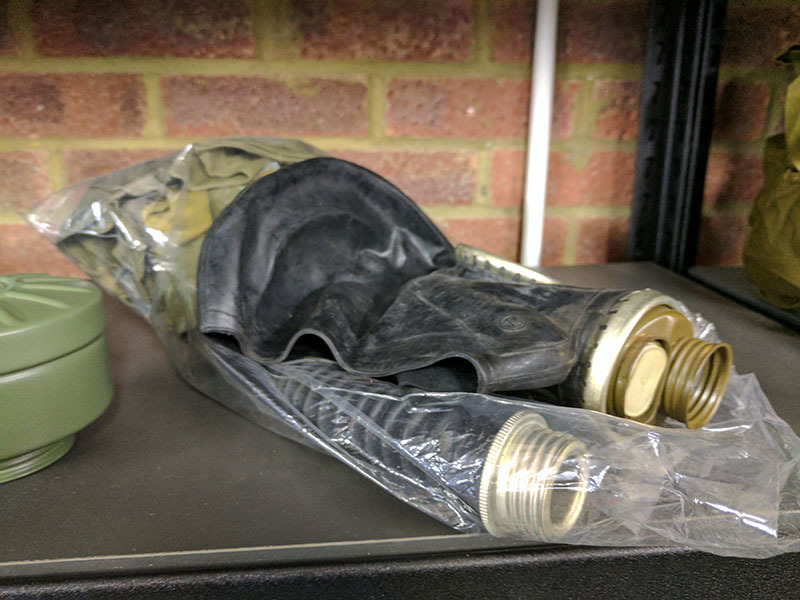
A gas mask on sale at the UK Prepper Store. The gas mask is their best-selling item.
- Further Information
-
Academic References:
Barkun, Michael (2003) “Religious Violence and the Myth of Fundamentalism.” Totalitarian Movements and Political Religions 4 (3): 55–70. doi:10.1080/14690760412331326230.
Barkun, Michael (2011) “Millennialism on the Radical Right in America,” no. April: 1–22. doi:10.1093/oxfordhb/9780195301052.003.0033.
Barkun, Michael (1994) “Reflections after Waco: Millennialists and the State.” In From the Ashes : Making Sense of Waco. Rowman & Littlefield.
Faubion, James D (2001) The Shadows and Lights of Waco: Millennialism Today. Princeton University Press.
Gould, Rebecca Kneale (2005) At Home in Nature: Modern Homesteading and Spiritual Practice in America. Berkeley, CA: University of California Press.
Gould, Rebecca Kneale (1999) “Modern Homesteading in America: Negotiating Religion, Nature, and Modernity.” Worldviews: Environment, Culture, Religion 3: 183–212.
Hall, John R., and Philip Schuyler (1997) “The Mystical Apocalypse of the Solar Temple.” In Millennium, Messiahs, and Mayhem: Contemporary Apocalyptic Movements, edited by Thomas Robbins and Susan J. Palmer, 285–311. Routledge.
Hoggett, Paul (2011) “Climate Change and the Apocalyptic Imagination.” Psychoanalysis, Culture & Society 16 (3): 261–75. doi:10.1057/pcs.2011.1.
Kabel, Allison, and Catherine Chmidling (2014) “Disaster Prepper: Health, Identity, and American Survivalist Culture.” Human Organization 73 (3): 258–66. doi:10.17730/humo.73.3.l34252tg03428527.
Kaplan, Jeffrey (1997) Radical Religion in America: Millenarian Movements from the Far Right to the Children of Noah. Syracuse, NY: Syracuse University Press.
Lamy, Philip (1996) Millennium Rage: Survivalists, White Supremacists, and the Doomsday Prophecy. New York: Plenum Press.
Lewis, James R., ed. (1994) From the Ashes: Making Sense of Waco. Rowman & Littlefield.
Lewis, James R., and J. Gordon Melton (1994) Church Universal and Triumphant: In Scholarly Perspective. Stanford: Canter for Academic Publication.
Linder, Stephen Norris (1982) Survivalists: The Ethnography of an Urban Millenial Cult. University Microfilms.
Mitchell, Richard G. (2002) Dancing at Armageddon : Survivalism and Chaos in Modern Times. University of Chicago Press.
Palmer, Susan J. (1996) “Purity and Danger in the Solar Temple.” Journal of Contemporary Religion 11 (3). Taylor & Francis Group: 303–18. doi:10.1080/13537909608580777.
Peterson, Richard G. (1984) “Preparing for the Apocalypse: Survivalist Strategies.” Free Inquiry in Creative Sociology 12 (1): 44–46.
Starrs, Paul F., and John B. Wright (2005) “Utopia, Dystopia, and Sublime Apocalypse in Montana’s Church Universal and Triumphant.” Geographical Review 95 (1): 97–121. doi:10.1111/j.1931-0846.2005.tb00193.x.
Toy, Eckhard (1986) “‘Promised Land’ or Armageddon? History, Survivalists, and the Aryan Nations in the Pacific Northwest.” Montana: The Magazine of Western History 36 (3): 80–82.
Wessinger, Catherine Lowman (2000) How the Millennium Comes Violently: From Jonestown to Heaven’s Gate. New York: Seven Bridges Press.
Wright, Stuart A. (1995) Armageddon in Waco : Critical Perspectives on the Branch Davidian Conflict. University of Chicago Press.
Wright, Stuart A. (2007) Patriots, Politics, and the Oklahoma City Bombing. Cambridge University Press.
Popular Culture/General References:
Coates, James (1995) Armed and Dangerous: The Rise of the Survivalist Right. Hill and Wang.
Prophet, Erin L. (2009) Prophet’s Daughter: My Life with Elizabeth Clare Prophet inside the Church Universal and Triumphant. Lyons Press
Saxon, Kurt (1988) The Survivor. Atlan Formularies.
Documentaries:
BBC 'Preppers' - Ready for Catastrophe? 2015
National Geographic Preppers UK: Surviving Armageddon. 2012
Online resources:
D’Anastasio, Cecilia. “Doomsday Preppers Are Planning to 3D Print Their Way Through the Apocalypse” (2016) Vice/Motherboard. 17 June. Available at: https://motherboard.vice.com/en_us/article/doomsday-preppers-are-planning-to-3d-print-their-way-through-the-apocalypse (Accessed 6 June 2017)
Benedictus, Leo. “Is it time to join the 'preppers'? How to survive the climate-change apocalypse” (2014) The Guardian. 17 February. Available at: https://www.theguardian.com/world/2014/feb/17/time-to-join-preppers-survive-climate-change-apocalypse (Accessed 6 June 2017)
Blair, Olivia. “Doomsday Ready: the British people preparing for the Apocalypse” (2017) The Independent. 17 February. Available at: http://www.independent.co.uk/life-style/doomsday-preparations-british-people-apocalypse-bunkers-supplies-water-a7584076.html (Accessed 6 June 2017)
Dixon, Hayley. “Inside Britain's Armageddon houses: Meet the 'preppers' who are stockpiling food and weapons because they fear the world will end” (2012) Daily Mail. 29 November. Available at: http://www.dailymail.co.uk/news/article-2240239/Armageddon-houses-Brit-preppers-stockpiling-food-weapons-preparation-end-world.html (Accessed 6 June 2017)
Huddleston, Chad. “Are You Prepared for Zombies?” (2012) American Anthropological Association Blog. 11 April. Available at: https://blog.americananthro.org/2012/04/11/are-you-prepared-for-zombies/ (Accessed 6 June 2017)
Lee, Adrian. “From escape routes to living in the wild: The SECRET world of Britain's DOOMSDAY preppers” (2016) Sunday Express. 1 January. Available at: http://www.express.co.uk/news/uk/630656/Britain-doomsday-preppers (Accessed 6 June 2017)
Leonards, Alexandra. “What is it like to be a UK survivalist?” (2015) Westminster World. 17 September. Available at http://westminsterworld.com/what-is-it-like-to-be-a-uk-survivalist/ (Accessed 6 June 2017)
Marsh, Stefanie. “Apocalypse soon: when disaster strikes, Britain’s preppers will be ready” (2015) The Times. 1 December. Available at: https://www.thetimes.co.uk/article/apocalypse-soon-when-disaster-strikes-britains-preppers-will-be-ready-slgc0fwqgcq (Accessed 6 June 2017)
Newton, Jennifer. “British people are prepping for NUCLEAR ATTACKS by stockpiling food and fuel… and they even have bunkers ready in case of Doomsday” (2017) The Sun. 17 February. Available at: https://www.thesun.co.uk/living/2891839/british-people-are-prepping-for-nuclear-attacks-by-stockpiling-food-and-fuel-and-they-even-have-bunkers-ready-in-case-of-doomsday/ (Accessed 6 June 2017)
Osnos, Evan. “Doomsday prep for the super-rich” (2017) The New Yorker. 30 January. Available at: http://www.newyorker.com/magazine/2017/01/30/doomsday-prep-for-the-super-rich (Accessed 6 June 2017)
Parsons, Jeff. “Inside Europe's only 'prepper' shop: What survivalists are buying to protect themselves from the end of the world” (2015) Mirror. 27 October. Available at: http://www.mirror.co.uk/news/technology-science/technology/inside-europes-only-prepper-shop-6714654 (Accessed 6 June 2017)
Parsons, Jeff. “'If the internet goes down, half the planet will come to a standstill': why 'preppers' will be the last ones standing” (2015) Mirror. 25 August. Available at: http://www.mirror.co.uk/news/technology-science/technology/if-internet-goes-down-half-6310887 (Accessed 6 June 2017)
Reuters Reporter. “It's the end of the world as they know it: How growing numbers of American 'preppers' are getting ready for Armageddon (by stockpiling food and guns)” (2012) Daily Mail. 23 January. Available at: http://www.dailymail.co.uk/news/article-2090586/Preppers-stockpile-supplies-preparing-fall-civiliation.html (Accessed 6 June 2017)
Sedacca, Matthew. “The new doomsayers taking up arms and preparing for catastrophe: American liberals” (2017) Quartz. 7 May. Available at: https://qz.com/973095/the-new-doomsayers-taking-up-arms-and-preparing-for-catastrophe-american-liberals/ (Accessed 6 June 2017)
Wells, Jonathan. “A prepper's guide to everything you need to survive the apocalypse” (2016) The Telegraph. 11 February. Available at: http://www.telegraph.co.uk/men/the-filter/a-preppers-guide-to-everything-you-need-to-survive-the-apocalyps/ (Accessed 6 June 2017)
Williams, Zoe. “Meet the preppers: inside the UK's only one-stop apocalypse shop” (2015) The Guardian. 30 October. Available at https://www.theguardian.com/uk-news/2015/oct/30/inside-the-uks-only-one-stop-apocalypse-shop (Accessed 6 June 2017)
Zand, Benjamin. “The British people preparing for the end of the world” (2015) BBC Magazine. 27 October. Available at http://www.bbc.co.uk/news/magazine-34637377 (Accessed 6 June 2017)
Author: Susannah Crockford, Inform
Last Updated: June 2017


